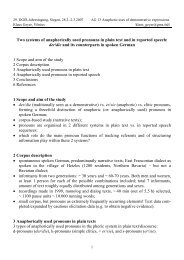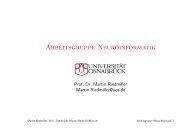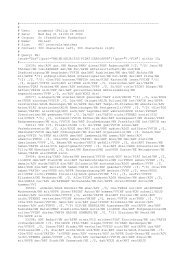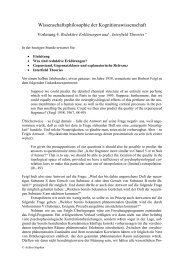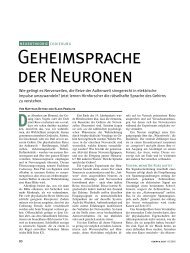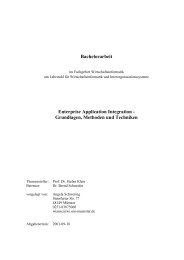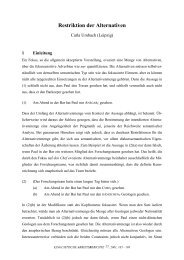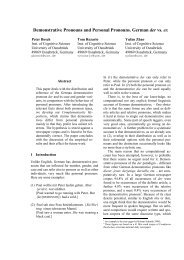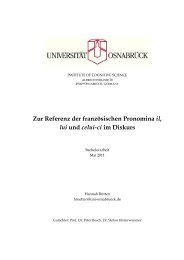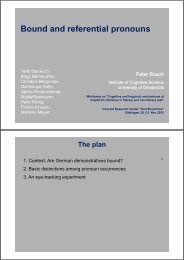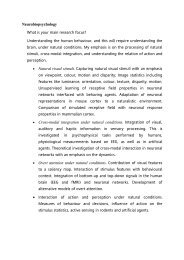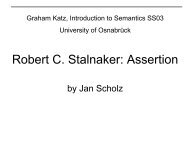Proceedings of the 6th Annual Meeting of the - Heinrich-Heine ...
Proceedings of the 6th Annual Meeting of the - Heinrich-Heine ...
Proceedings of the 6th Annual Meeting of the - Heinrich-Heine ...
Create successful ePaper yourself
Turn your PDF publications into a flip-book with our unique Google optimized e-Paper software.
2 Non-dynamic accounts.<br />
Among non-dynamic approaches to (1) we can distinguish between those which assume that <strong>the</strong><br />
pronoun in <strong>the</strong> second sentence is bound by <strong>the</strong> indefinite in <strong>the</strong> first and those which do not.<br />
Among <strong>the</strong> latter, E-type accounts assume that <strong>the</strong> pronoun in <strong>the</strong> second sentence goes proxy<br />
for a definite description. E-type approaches in turn can be distinguished according to whe<strong>the</strong>r<br />
<strong>the</strong>y treat <strong>the</strong> relation between indefinite and pronoun as mediated by linguistic rule.<br />
2.1 Static binding<br />
In terms <strong>of</strong> <strong>the</strong> traditional framework <strong>of</strong> semantic description, <strong>the</strong> only analysis according to which<br />
anaphoric pronouns such as in (1) are be treated as variables has thus far been to assume that <strong>the</strong>y<br />
are bound cross-sententially. The binding approach is motivated by <strong>the</strong> generally accepted<br />
intuition that (1) is understood according to <strong>the</strong> gloss in (2)a or according to <strong>the</strong> analysis in (2)b.<br />
This is <strong>the</strong> reading upon which Geach (1962) basis his proposals. It should be emphasised that it<br />
is not thought that <strong>the</strong>re would necessarily be a uniqueness implication in such cases according<br />
to which just one man walked in <strong>the</strong> park:<br />
(2) a. A man who walked in <strong>the</strong> park whistled.<br />
b. ›x[man’(x) v walked_in_<strong>the</strong>_park’(x) v whistled’(x)].<br />
The idea that our understanding <strong>of</strong> such anaphoric relations is due to binding is fur<strong>the</strong>r motivated<br />
by <strong>the</strong> apparent fact that pronouns which derive <strong>the</strong>ir interpretation from previous discourse are<br />
judged to be inappropriate where <strong>the</strong>re is no proper antecedent. The infamous marble discourse,<br />
due to Barbara Partee, typically illustrates <strong>the</strong> point. (3)a below is judged infelicitous in spite <strong>of</strong><br />
<strong>the</strong> fact that <strong>the</strong> pronoun in <strong>the</strong> final sentence is clearly meant to refer to <strong>the</strong> missing marble.<br />
Given that <strong>the</strong> antecedent sentences in (3)a and (3)b make available <strong>the</strong> same information, <strong>the</strong><br />
contrast in acceptability suggests that <strong>the</strong>re is something about <strong>the</strong> manner in which <strong>the</strong><br />
information is presented which is <strong>the</strong> source <strong>of</strong> <strong>the</strong> unacceptability. Given <strong>the</strong> ancillary assumption<br />
that deictic pronouns are only properly used in <strong>the</strong> physical presence <strong>of</strong> <strong>the</strong>ir referent, <strong>the</strong>re is a<br />
straightforward account <strong>of</strong> this given <strong>the</strong> binding approach: <strong>the</strong>re is nothing to bind <strong>the</strong> pronoun<br />
in question, so it cannot receive an interpretation.<br />
(3) a. I had ten marbles but dropped <strong>the</strong>m. I found nine. ?It had rolled under <strong>the</strong> s<strong>of</strong>a.<br />
b. I had ten marbles but dropped <strong>the</strong>m. I found all but one <strong>of</strong> <strong>the</strong>m. It had rolled<br />
under <strong>the</strong> s<strong>of</strong>a.<br />
Without going into formal details, however, it is not difficult to be convinced that <strong>the</strong> binding<br />
approach suffers from a lack <strong>of</strong> generality. If <strong>the</strong> indefinite is treated as some kind <strong>of</strong><br />
quantificational expression and <strong>the</strong> pronoun as a variable-like element, <strong>the</strong>n one would assume<br />
that if cross-sentential binding can occur in <strong>the</strong> case <strong>of</strong> (1)a, it should occur in <strong>the</strong> case <strong>of</strong> o<strong>the</strong>r<br />
quantificational expressions. But this is not <strong>the</strong> case. Consider that (4)a cannot be understood as<br />
(4)b as we would expect if cross-sentential binding were a general phenomenon:<br />
(4) a. Every boy left school early. ?He went to <strong>the</strong> beach.<br />
b. Every boy left school early and went to <strong>the</strong> beach.<br />
A more telling consideration involves certain quantificational antecedents as in (5). Here, <strong>the</strong><br />
binding account predicts (5)a to be equivalent to (5)b and misses <strong>the</strong> fact that (5)a entails that just<br />
one boy left school early:<br />
18



